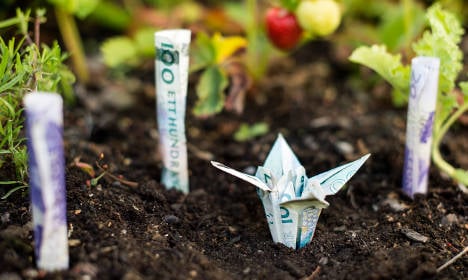Sweden's GDP showed a strong annual rise by 3.0 percent in the second quarter of 2015, compared to the same period the year before, according to Statistics Sweden. Experts had predicted 2.5 percent growth.
GDP is one of the most important indicators used to assess the health of a nation's economy and represents the total value of goods and services produced over a set length of time.
And Finance Minister Magdalena Andersson welcomed the news on Thursday.
“The new figures are a positive message about the Swedish economy's recovery. The most important thing for the government now is partly to continue to ensure healthy state finances and decreasing deficit, and partly to focus on measures to make sure more people get into work,” she told the TT news agency.
READ ALSO: Why Sweden's economy is brightening in 2015
One of the key reasons for increased growth is Swedes themselves opening their wallets, Robert Bergqvist, chief economist at banking giant SEB, told The Local on Thursday.
“Households are keeping a strong balance sheet and a decent financial position. Many feel wealthier, which means that people feel braver and end up consuming more. Their good economic strength results in purchasing power because wages are rising and inflation is low,” he said.
The weaker-than-normal Swedish krona has strengthened the export industry, which has also benefited from a stronger European market. Last month Swedish exports amounted to a total value of 108,9 billion kronor – 14 percent more than June last year and the highest level in several years.
“The market is moving in Germany which is Sweden's biggest market for export. It consists of various kinds of investment goods – Swedish export industry is dependent on solid investment growth, which is a disadvantage after the collapse in 2008. But successful sectors of the export industry are raw materials, metal, steel and wood,” said Bergqvist.
GUIDE: What the weak krona means for expats
Thursday's GDP figures far exceed a prognosis by Sweden's Central Bank (the Riksbank), which had predicted the economy would grow by 2.5 percent in the second quarter of the year.
However, the bank's main target is inflation, so it is unlikely to be swayed by GDP rates, according to Bergqvist.
Earlier this month, the bank lowered the country's already historically low interest rate even further. They key rate, the repo, fell to a record low of minus 0.35 percent in an attempt to kick-start a slow-moving economy back into action.
The idea behind the cut is to try and boost inflation in order to raise the price of everyday goods and services in Sweden which have been stagnant for two years. It is argued that this in turn will improve the country's economic prospects.
Additional research and interview by Elin Jönsson.



 Please whitelist us to continue reading.
Please whitelist us to continue reading.